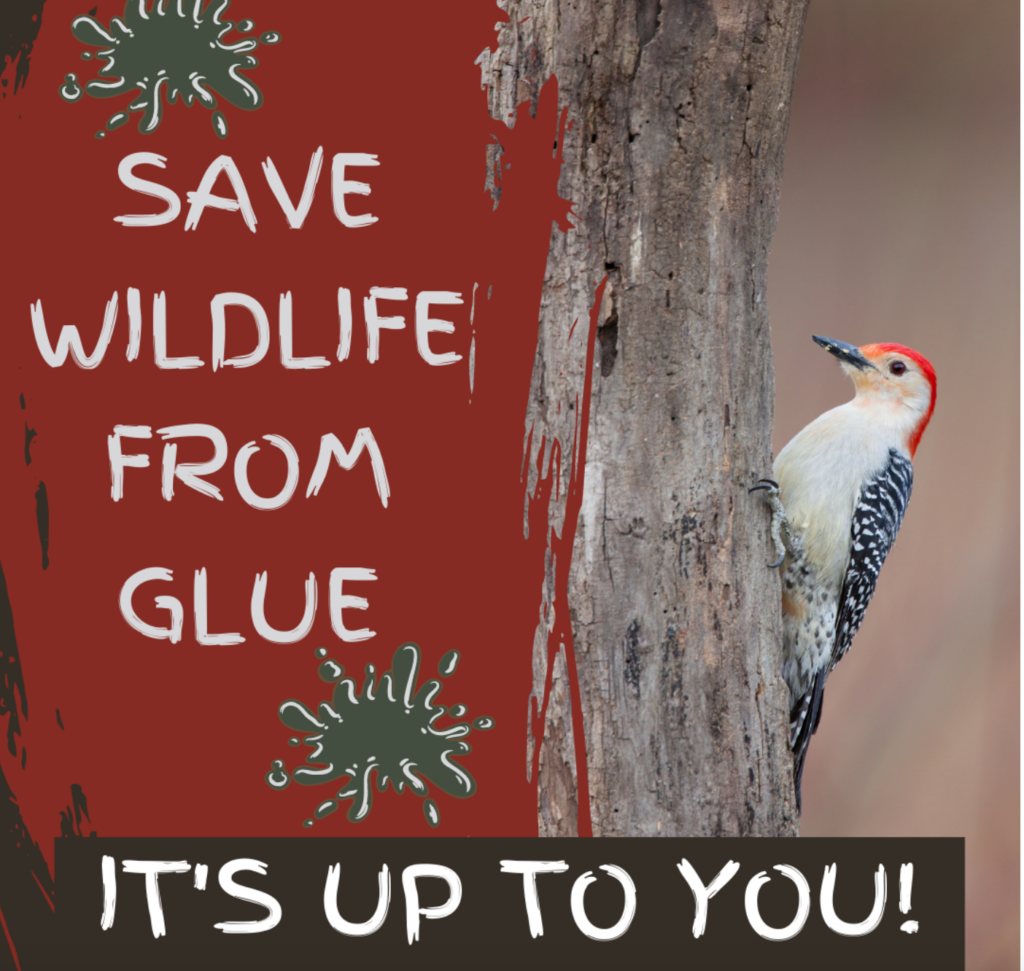YOU CAN ACT TO SAVE BIRDS, BATS, AND BENEFICIAL BUGS!!!!
As if it wasn’t already hard enough be to a bird, there’s yet a new threat. Last fall, Pennsylvania Wildlife Rehabilitators (PAWR) asked for help to stop wildlife bycatch on glue tape wrapped around trees intended to trap Spotted Lanternflies (SLFs). There are several effective wildlife-friendly techniques to reduce SLFs now available, but use of the indiscriminate glue trap has proliferated and is growing exponentially with the spread of the insect.
Birds are attracted to the glue to forage for other victims – native insects. While birds represent the majority of the wildlife with over 30 species represented, bats and squirrels are also trapped. Even hawks and owls! The number of victims brought to Rehabilitators increased at least 4-fold in 2020 to MANY hundreds of birds, bats, and squirrels. Unfortunately, only a small number of victims actually make it to a Rehabilitator, and because of the nature of injuries on glue, most can’t be released.
Lehigh Valley Audubon Society (LVAS) is preparing materials you can use to communicate with your members, partners, and community to help stop the use of glue traps. We have published a webpage https://www.lvaudubon.org/bird-bycatch with an overview of the project and we’re adding links to materials including flyers, social media posts, articles, and sample letters that can be sent to retailers and public/ government land managers. While we’re advocating with state-wide organizations, we need your help us stop this new threat to birds in your locality.
How Chapters Can Help:
- Communicate the issue with your members and ask them to help
a. Post our social media slideshow
b. Include an article in your newsletter or email - If you have a physical location, display and hand-out our Awareness Flyer
- Display a Circle Trap on an SLF infested tree
- Communicate with your community partners and local news media to help us reach a broader audience
- Help us identify organizations or businesses that are perpetuating the use of glue traps for advocacy
Let us know what materials you need and how we can assist you. Contact Karen at [email protected].

From Channel 6 Action News Philadelphia June 11, 2021
NORRISTOWN, Pennsylvania (WPVI) — “We’re here to undo the damage that human beings cause in the environment,” said Rick Schubert, a wildlife rehabilitator and lifelong animal lover.
Schubert is the Executive Director at the Philadelphia Metro Wildlife Center, which has seen an increase in animal injuries related to spotted lanternfly-killing tape meant to protect trees.
Woodpeckers, nuthatches, and squirrels are among the crowd that gets caught while crawling up the trunks. But over this past weekend, three Eastern Screech Owls got snagged in the trap.
The family who discovered the injured birds made the right decision by calling the PMWC at 267-416-9453, which Schubert says should always be the first step.
“I brought the animal into the surgery room. I put all three of them under anesthesia and we slowly surgically extracted them from the tape,” said Schubert. “Took us about an hour.”
Rehabilitators like Schubert must be very precise in their handling of wildlife. That’s why they dissuade the community from attempting to remove birds on their own.
Jackie Kent, Director of Education at PMWC, has some more advice to offer.
“Stress is the number one killer of the animals that are brought in,” she added. “So, we ask that they don’t feed or give them water because that can actually sometimes harm their internal systems if it’s already being taxed by their injury.”
Kent adds that some animals can be aided before the injury occurs. While she discourages the use of spotted lanternfly tape, she recommends a quick fix to limit its victims to the titular pest.
“We suggest that people wrap it with hardware cloth, which is like a metal mesh that you can buy at any hardware store,” she said. “It can go a long way in helping those animals not get stuck, or not get stuck so severely that they are beyond repair.”
For more information on how to handle injured wildlife, call the Philadelphia Metro Wildlife Center at 267-416-9453 or visit their website.
